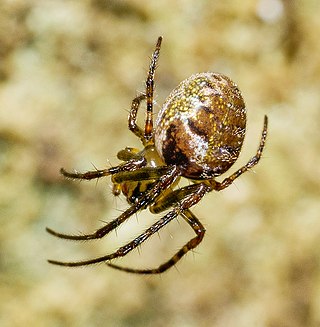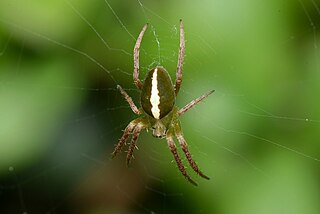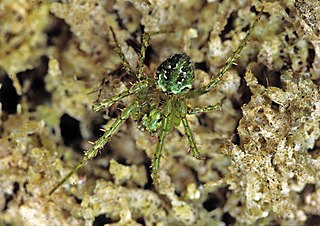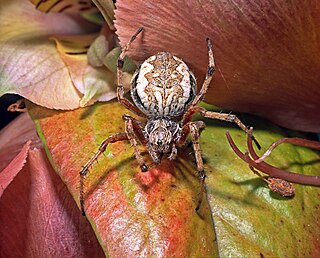
Avicularia is a genus of the family Theraphosidae containing various species of arboreal tarantulas. The genus is native to Panama, the Caribbean and tropical South America. Each species in the genus has very distinguishable pink foot pads.

Philoponella is a genus of uloborid spiders. Like all Uloboridae, these species have no venom.
Chalcolecta is a spider genus of the jumping spider family, Salticidae.
Thianella is a possible monotypic genus of jumping spiders containing the single species, Thianella disjuncta. It was first described by Embrik Strand in 1907, and is found only on Java. Based on a male specimen, Roewer placed it close to Thiania, but his placements of salticids have often been questionable and no drawings currently exist. The name is an alteration of the salticid genus Thiania, and the species name is from Latin disiunctus "separated". The World Spider Catalog regards the genus and species names as nomina dubia.

Celaenia is a genus of South Pacific orb-weaver spiders first described by Tamerlan Thorell in 1868.

Philodromus is a genus of philodromid crab spiders. Spiders in this genus are distinctively flattened.

Meta is a genus of long-jawed orb-weavers that was first described by Ludwig Carl Christian Koch in 1835. They are often associated with caves, caverns, and recesses, earning some of them the name "cave orbweavers"

Taraire is a small genus of Polynesian long-jawed orb-weavers. The genus was first described by A. Álvarez-Padilla, R. J. Kallal and Gustavo Hormiga in 2020, and it has only been found in New Zealand. They build vertical orb webs near forest floors, and can be found resting in the center. The genus name is a reference to Beilschmiedia tarairi, the native New Zealand tree that they are commonly found in.

Arkys, also known as triangular spider or ambush spider, is a genus of Australian araneomorph spiders in the family Arkyidae, first described by Charles Athanase Walckenaer in 1837. They are often small, with a triangular shaped abdomen, and are found in Australia and some of its surrounding islands. They don't build webs, but can often be found on leaves and tips of flower heads. Their egg sacs are pinkish-orange and spherical, and are made late in the summer.
Cyclosternum is a genus of tarantulas that was first described by Anton Ausserer in 1871.

Nanometa is a genus of long-jawed orb-weavers containing the fifteen species. It was erected by Eugène Louis Simon based on the type specimen of Nanometa gentilis found in 1908. It is included in a clade of its own defined by nine morphological synapomorphies, along with the genus Orsinome.

Backobourkia is a genus of South Pacific orb-weaver spiders first described by Volker Framenau, Nadine Dupérré, Todd Blackledge & Cor Vink in 2010. It is a common Australian spider, closely related to Eriophora and placed in the "coxal hook clade" of the Araneinae subfamily of Araneidae. Females are generally the same size among all species, but males are much smaller, suggesting male dwarfism throughout the genus. The genus name is a play on the well-known Australian idiom, "Back of Bourke", meaning very remote and beyond the limits of civilization.

Colaranea is a genus of orb-weaver spiders first described by D. J. Court & Raymond Robert Forster in 1988 that are endemic to New Zealand.

Cryptaranea is a genus of South Pacific orb-weaver spiders first described by D. J. Court & Raymond Robert Forster in 1988.
Heurodes was a genus of orb-weaver spiders first described by Eugen von Keyserling in 1886. It previously contained three species, Heurodes fratrellus and Heurodes turritus, both now considered nomen dubium, and Heurodes porcula, now considered a synonym of Eriovixia porcula(Simon, 1877)

Novakiella is a genus of South Pacific orb-weaver spiders containing the single species, Novakiella trituberculosa that has only been found in Australia and New Zealand.

Zealaranea is a genus of orb-weaver spiders first described by D. J. Court & Raymond Robert Forster in 1988.
Acroaspis decorosa is a species of orbweaver spider that is endemic to New Zealand.
Arthur Torrane Urquhart (1839–1919) was an arachnologist and naturalist based in New Zealand.

Tawhai is a monotypic genus of Polynesian long-jawed orb-weavers containing the single species Tawhai arborea. The genus was first described by A. Álvarez-Padilla, R. J. Kallal and Gustavo Hormiga in 2020, and it has only been found in New Zealand. The type species, Tawhai arborea, was originally described under the name "Tetragnatha arborea".













